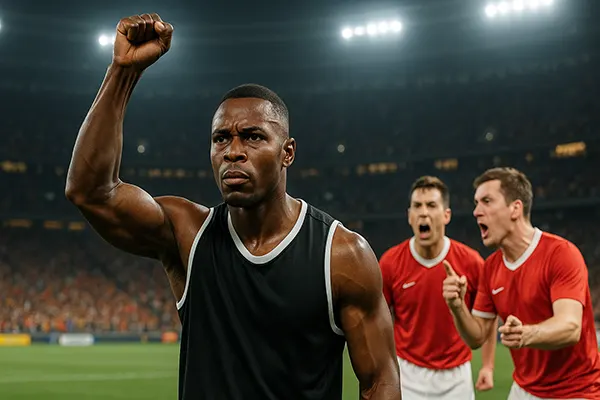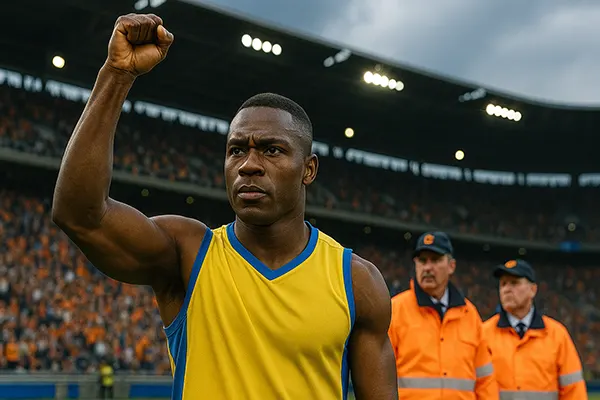Forgotten Sporting Controversies: When Celebrations Became Scandals

Sport has always been more than physical competition. It is a stage where cultural values, emotions, and even political messages are expressed. While most celebrations aim to show joy and pride, there have been numerous moments in history when gestures crossed the line of what society considered acceptable. These controversies reveal not only the passion of athletes but also the boundaries imposed by etiquette, tradition, and moral expectations.
Historical controversies around sports gestures
Looking back through the twentieth century, some sporting gestures became unforgettable not because of their brilliance but because of the outrage they created. For example, the raised fist salute by Tommie Smith and John Carlos during the 1968 Olympics was interpreted both as a courageous fight for civil rights and a violation of the Olympic Charter. The gesture brought immense media attention, but also heavy sanctions from the International Olympic Committee, which was determined to keep politics out of sport.
Another example comes from football. In the 1980s and 1990s, provocative celebrations such as players showing offensive hand signals or mocking opponents were harshly criticised. These actions highlighted the tension between spontaneous emotional expression and the official codes of conduct that leagues tried to enforce. Sanctions often followed, proving that authorities considered gestures just as powerful as words.
Even in team sports like rugby or cricket, taunting or overly theatrical celebrations were seen as breaches of etiquette. They might not have carried the same political weight, but they shaped how athletes were perceived by fans and the media, influencing their reputation for years to come.
The cultural lens of past decades
In earlier decades, society was less tolerant of what was perceived as arrogance or disrespect. Celebrations were expected to remain restrained, with the emphasis placed on humility and respect for opponents. Gestures that today might be seen as harmless showmanship were once capable of sparking full-scale debates in newspapers and sports councils.
Media coverage in those times often amplified the outrage, framing athletes as either heroes or villains depending on the narrative. The lack of social media meant these controversies lasted longer, as public discourse unfolded slowly in print and broadcast outlets. This gave gestures an almost symbolic power, shaping national conversations about values and morality.
Such controversies remind us that sport is deeply connected with cultural norms. What one generation considers disrespectful might later be reinterpreted as a bold statement of individuality or even courage.
Modern controversies in celebrations
In the twenty-first century, controversies over gestures and celebrations did not disappear; they evolved. Football remains a central stage. Players have been fined or suspended for politically charged hand signs, mocking rival fans, or mimicking controversial figures. These actions spread rapidly across social media, often sparking international debates within hours.
In basketball and American football, choreographed celebrations sometimes pushed the boundaries. The NFL, for example, introduced strict rules to limit excessive celebrations, arguing that they distracted from the game and could be offensive. Yet fans often criticised these restrictions, believing that passion and expression are part of the sport’s charm.
Even tennis, usually known for its formal etiquette, has faced criticism when players gestured aggressively towards crowds or officials. These incidents underline how global audiences have different expectations depending on the sport, but all are sensitive to the line between expression and misconduct.
The role of social media today
The digital era has magnified every gesture. A controversial celebration can be replayed millions of times within hours, analysed from every angle, and transformed into global debates. What might once have been a fleeting moment of emotion is now preserved indefinitely, with long-term consequences for athletes’ reputations and careers.
Social media also creates polarisation. Supporters may defend a gesture as an authentic display of passion, while critics see it as inappropriate or offensive. This duality makes modern controversies more complex, with athletes caught between personal freedom and public responsibility.
As a result, sporting organisations must constantly adapt their rules. They attempt to balance players’ right to celebrate with the need to maintain respect, inclusivity, and fairness on the field. The pressure to respond quickly often shapes decisions on sanctions or disciplinary measures.

Changing moral standards in sport
Over time, the definition of what is acceptable in sporting celebrations has shifted. Actions that once led to punishment may now be considered normal, while other gestures are judged more harshly because of evolving cultural sensitivities. This fluidity highlights the role of sport as a mirror of society.
For example, expressions of pride in cultural or national identity are more widely accepted today, yet any hint of discriminatory or political undertones can bring swift condemnation. Athletes must navigate this landscape carefully, aware that one gesture can strengthen their image or destroy it overnight.
Furthermore, sponsors and broadcasters also influence standards. They often pressure governing bodies to act when celebrations are viewed as damaging to brand values or too controversial for family audiences. Thus, moral judgement in sport is not only a matter of tradition but also of economic interests.
The ongoing debate about freedom and responsibility
The tension between self-expression and responsibility will likely never be resolved fully. Athletes are public figures, and their celebrations carry symbolic weight far beyond the playing field. Fans admire passion but also demand respect for opponents, traditions, and diverse audiences watching worldwide.
Some argue that strict regulation risks sterilising sport, stripping it of the emotions that make it compelling. Others counter that without boundaries, celebrations risk becoming offensive or divisive. This debate continues to shape policies in football, athletics, rugby, and beyond.
Ultimately, controversial gestures serve as reminders of sport’s cultural power. They challenge society to reflect on its values and force governing bodies to reconsider where the lines should be drawn. The dialogue between freedom and responsibility ensures that celebrations will remain a vibrant, if sometimes scandalous, part of sporting history.
